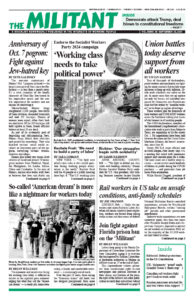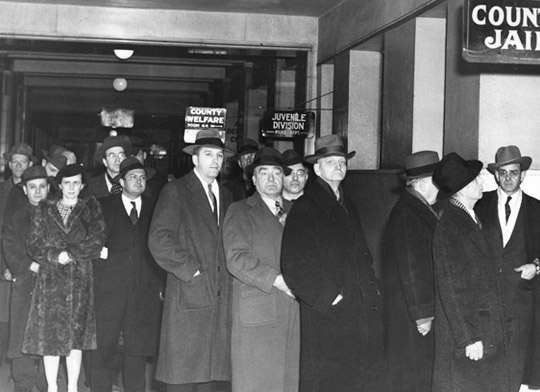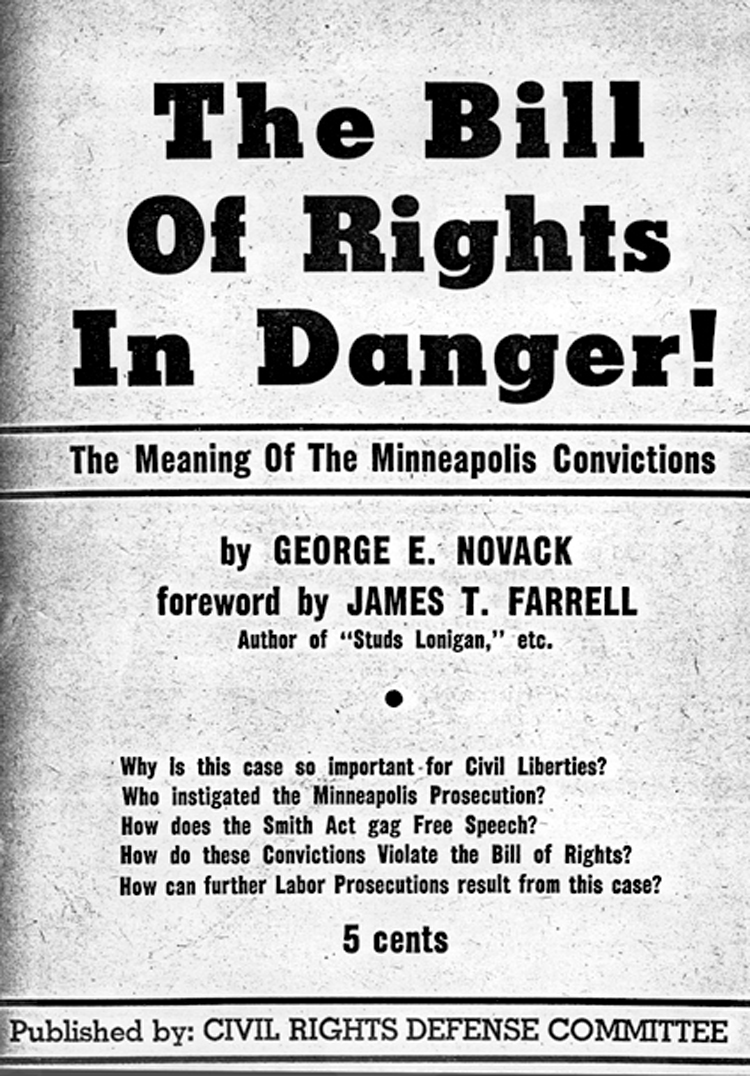Central to the Democrats’ efforts to hold onto the White House in 2024 are relentless attacks against their main opponent, Donald Trump, including a four-part legal offensive that threatens constitutional rights crucial for working people.
They’re determined to get tens of millions to view him as a criminal who must be driven out of politics at all costs. And they’re now reviving claims he’s connected to concealed election-meddling in the November election by the Vladimir Putin regime in Moscow.
Each of the cases against Trump deals blows to free speech, the right to a fair trial and other vital protections against government intervention.
Regardless of the fact that the target is a candidate of the Republican Party — one of the two main parties serving the capitalist class — working people have an important stake in demanding the cases be thrown out. Similar frame-up assaults and far worse have been used to go after militant workers, fighters for Black rights, the Socialist Workers Party and opponents of Washington’s wars. They will be again, as new struggles by working people emerge.
In a case brought in Washington, D.C., by Justice Department special counsel Jack Smith charging Trump “interfered” with the 2020 election, Judge Tanya Chutkan set a new timetable for pretrial hearings.
On Sept. 5 Chutkan said prosecutors will have up to Oct. 29 — seven days before the vote — to respond to Trump’s motion to dismiss the case. She rejected Trump’s motion for deadlines in the hearing to be set after the election.
She claims the timing of the election is “not relevant” to the schedule she’s imposed. But her ruling offers liberal media further pretexts to launch an avalanche of hysteria about Trump and the Jan. 6, 2021, riot just prior to the 2024 vote, to give a boost to the campaign of Kamala Harris.
The Supreme Court had ruled July 1 that Trump — like any president — has some immunity from prosecution for acts related to his official duties. It sent Smith’s charges back to Chutkan to review in light of the decision.
Smith then filed a new, cut down, set of charges Aug. 27. This was just 10 days short of 60 days before the election, a period during which the Justice Department has a policy of not issuing new charges against presidential candidates.
Trump said the new indictment was an attempt to interfere with the election. Both the new and old charges target Trump for things he said about the 2020 election to state officials and Vice President Michael Pence. Regardless of whether his comments were accurate, they’re protected by the court’s ruling and the First Amendment.
Russia-collusion hoax redux
As the 2024 vote nears, the Justice Department has resurrected claims that Putin is carrying out a disguised and elaborate effort to help Trump win the election. They insinuate that Trump may be involved.
Attempts to tar Trump as a threat to “national security” go back to Hillary Clinton’s 2016 campaign. Her election committee paid a former British spy to concoct slanders that Trump was “colluding” with Putin. Based on this, the Barack Obama administration unleashed the FBI to spy on Trump’s campaign.
Clinton claimed she lost the election because of Moscow’s intervention. A sprawling investigation into these claims was opened by the Democratic Party-controlled Congress in 2017, headed by ex-FBI boss Robert Mueller. After months of leaks, he came up empty handed, but his probe led to the jailing of several Trump associates on unrelated charges in a thinly veiled attempt to get them to finger the former president for something.
On Sept. 4 Attorney General Merrick Garland — the same Biden administration official who unleashed Smith’s witch hunt and charges against Trump — announced the indictment of Kostiantyn Kalashnikov and Elena Afanasyeva, two employees of Russia Today, for failing to register as foreign agents.
This is becoming a popular charge for the administration. A frame-up trial began Sept. 3 against three leaders of the African People’s Socialist Party and its support group UHURU on charges they are secret agents of Moscow.
Under the Foreign Agents Registration Act anyone whose views are similar to those of a foreign government can be targeted for FBI harassment and prosecution. The FBI used the law to justify going after the SWP after it was passed in 1938 as one of a series of witch hunt laws enacted on the eve of the second imperialist world war.
Garland claims the two Russia Today staffers were meddling with the 2024 election. He released redacted documents showing they tried to boost the campaign of an unnamed candidate whose description matches Trump. Neither of the alleged meddlers is likely to go to trial soon, given that their whereabouts are unknown. But the indictment, like the department’s entire operation, is aimed at boosting Harris’ campaign.
The same day as Garland’s announcement, the Justice Department also shut down 32 internet domains they claimed were tied to Moscow and spreading “disinformation.”
Safeguarding constitutional protections against government interference with free speech and political association remains a key question for working people today.



